Rasa Alksnyte
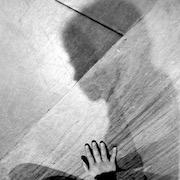
Rasa Alksnyte is a transdisciplinary artist, photographer, teacher and mentor based in Belgium. Through her background in performing arts, she has an ability to take you by surprise. Her mind is filled with rarities and working practices that extend beyond expected frameworks and boxes. She often surrounds herself with energy that inspires others to play, experiment, cook, and garden. By gently assisting she encourages and opens up other artists to face difficult questions, find solutions, and strive for a higher creative level. In her work with children, Rasa doesn’t teach but tries to fill their heads with rainbows, self-made toys, and sweetness. When facilitating groups Rasa helps participants to take small steps forward and connect separate images into one beautiful picture. Rasa Alksnyte works with everything that grows and grows and grows…
Florin Flueras
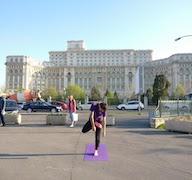
Florin Flueras' work expands into spheres of politics, philosophy, spirituality, health care, media, education, and literature – producing performative meetings between art and its outside, affecting conventions and certainties in both areas. More than visual or conceptual, he sees his recent practice as affect art. During the PHPCI conference, he will activate Collapse Yoga (2016) in different spaces and situations. Collapse Yoga mixes Yoga with possible "negative" states such as sadness, illness, anxiety, hopelessness, worry, renouncement, exhaustion, grief, boredom, decrepitude, failure, and their traces in the body. It collides Yoga's aims for coordination, balance, strength, and flexibility with the body's deep desires for asymmetry, incoordination, weakness, relaxation, freedom, unbalance, abandonment, and collapse. It affects the normativity of the human form. Collapse Yoga can tune our bodies with natural, cultural, and personal collapsing environments, affecting maybe some of them. The relation with our bodies tends to extend to the entire reality – there is a correspondence and influence between the body's politics and society's problems.
Oracle (Michel Yang, Caroline Daish & Justine Maxelon)
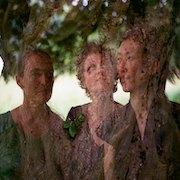
Michel Yang, mother, artist and incredibly strong woman, died on a summer morning two years ago after a long illness. When it became clear death was imminent, Michel orchestrated a ‘mini-holiday’ as a way to support her in her death process. A small group of intimi stayed with her on a farm in the countryside, to together support and shape the process leading up to and after her death. The experience was both incredibly hard as well as potent and utopic to be part of. Michel’s close colleagues: Caroline Daish and Justine Maxelon, with whom she formed a “connective”, developing the body-voice improvisation practice oracle, their mentor Rasa Alksnyte- as well as the curators Wouter Bouchez and Julie Rodeyns, who also became involved in Michel’s funeral, will in the framework of this conference together look back on the legacy of this process, highlighting the unique contribution and expertise artists can bring in designing palliative processes and funerals. Now, after Michel’s death, Caroline and Justine grapple with the question how to continue with oracle. Listening is at play to understand the transition and growth oracle wishes to undergo. How to care for oracle as a practice and how to let oneself and the community be cared for by a practice? How to give agency to a practice and let oneself be guided by it? These are only some of the questions, they will bring to the conference…
Justine Maxelon is a Brussels-based dancer and performer. She is a practitioner of things; mainly working collectively around notions of listening, care and voice in relation to body and surroundings. At the moment she is exploring healing understood as ongoing care, the possible relations between art and an elderly home in Brussels, gardening and communal practices of sharing both in the art context and beyond. In all her engagements, thinking and doing that focuses on the reflection and implementation of Fairer Arts Practices is important for her.
Caroline Daish works independently performing for other artists and collaboratively in community arts projects. She has co-founded several arts organisations and practices both in Australia and Europe since graduating in the 80s from Adelaide Uni Theatre Studies. Improvisation has always been the centre of her research as a performance mode, tool for devising or a way to communicate and facilitate at the nexus of voice, physical theatre, film & sound. She is interested how we rub-up against and with each other as we develop ways of working and creating together. Caroline has rubbed up with: Myriam Van Imschoot, Mette Edvardsen, Restless Dance Co, Françoise Berlanger, Stewart Daish, Ana Torfs, ICTUS and Maria-Lucia Cruz, to name a few.
Michel Yang is an American born, Brussels-based performance artist. Her work explores notions on identity and cultural hybridity. Her own creations have involved rewriting scars, brick-laying her body, fashioning heels out of candle holders, teaching French while speaking fake Chinese… Such works root from her practices on tracing resistance, framing identity, and embodying objects, spectres, and nothing. Michel’s primary medium is the body, however, video and photography have entered her work as extensions of her body practice. Michel received a Master of Fine Arts in Dance at New York University’s Tisch School of the Arts and has completed a post-graduate study in performance with a.pass. As a performer she has worked with Lilia Mestre, Stefan Dreher, Pierre Droulers, Mia Lawrence, and Walter Verdin to name a few.
Ellen Lili Vanderstraeten
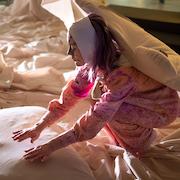
Performer, creator, and curator Ellen Lili Vanderstraeten is fascinated by co-creative ways of making art and the multiformity of textiles. Her work departs from daily routines of care such as walking, sleeping, cooking, reading ... which she experimentally loosens from their monotonous patterns to create new sensory experiences. For the congress, Lili will share a new body of work called Huskrooms: a growing archive of duvets that carry carefully composed found objects and cloth. She gathers the materials during long walks with friends, family, and collaborators: going to thrift shops or collecting old sheets left behind in dusty closets and boxes in the attic. Next, the materials are put together during a focused research on colors and textures, in a search for poetics and meanings that arise through the friction of bringing together abandoned materials that usually are not brought into the same space. All of this is part of an important practice of spending time together and opening up space for verbal and non-verbal play and conversation around the topic of care, that the artist proposes during these instances. Gestures and thoughts that come up during this joint process are intuitively included in the making of these duvets. The duvets are put together in a time-consuming process of cutting and sewing the artwork. Lili will share this process with you- and invite you into a space to jointly think about the specific conditions that people need in order to focus on inner self-perception.
More information will follow soon!
Questions?
Please contact: endoflifecare@vub.be
Anais Chabeur
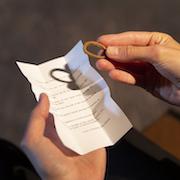
Anaïs Chabeur is an artist based in Brussels. She graduated from La Cambre (Brussels) in 2016 and HISK (Ghent) in 2018. Anaïs crafts poetic and sensorial atmospheres, invitations to inhabit time consciously. Through films, objects and texts, her practice seizes liminal situations touching upon finitude. The visitors are often invited to interact with the pieces allowing for emotional, historical, or vibratory charges to be shared in the confidential setting of her exhibitions. The intimacies of dying are an underlying topic in her work and life. She poetically approaches gestures of care and their necessity, weaving personal fictions with the universality of death.
Fiona Hallinan
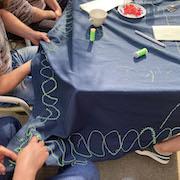
Fiona Hallinan is an artist and researcher, graduated with BA and MSc from Trinity College Dublin, currently undertaking a practice based doctoral project at LUCA School of Arts KU Leuven. Hallinan’s doctoral project explores the coming-into-being of the concept of Ultimology, which proposes the study of endings as an urgent concern. In this project, which began through a collaborative residency as the Department of Ultimology at the CONNECT Centre for Future Networks at Trinity College Dublin, specific endings are established as case studies; the demolition of a Catholic church in Dublin, Ireland or the extinction of a specific plant in the Pajottenland, Belgium. Death is an unavoidable phenomenon we can, at least, describe as a significant ending. Could its associated traditions, practices and understandings, honed over generations of co-existence, offer insights into how we might manage to look directly at endings? A reading group set up by Hallinan to explore these questions has led to establishing an embroidery circle where participants, while working with their hands, are invited to share personal experiences and knowledge of death and dying. For the PHPCI conference this participatory workshop will be available for attendees to join. Participants sew together, mapping an elusive understanding of death and dying onto a tablecloth. We create a caring space for slow, inconsistent and sometimes difficult conversation. This object, with collective knowledge sewn into it, will go on to inform a set of tools, practices and devices to give life to Ultimology, accommodating meals and conversations that delve into other endings.
Hoda Siahtari
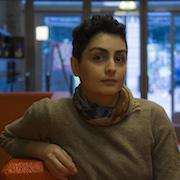
Hoda Siahtiri is a multidisciplinary artist and researcher based in Brussels. Since 2020 she is affiliated as an artistic Ph.D. researcher with University of Antwerp and the University-college of Sint Lucas Antwerp to advance her research Singing The Silences. Her research revisits and mediates the historical Bakhtiari women singing practice of grief. Hoda’s artistic focus is on collective and individual artistic practices of grief. She explores lamenting and bodily sonic resonation as a journey of revisiting, reconstructing, and narrating by entering the body scapes of pain and sufferance one has been through as an individual and in generations. She works with these experiences in her artworks as the fuel of commonality to build up connections of care and deep healing.
Luca Vanello
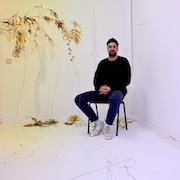
Luca Vanello is an Italian-Slovene visual artist who lives and works in Brussels. He recently started a Ph.D. at FASoS (Maastricht University Faculty of Arts and Social Sciences). Vanello creates hybrid sculptures in which organic material, stripped of its color by a chemical process fuses with other forms, such as plastic components from exteroceptive sensors used in humanoid robotics, or the energy consumption of a server of a memorial website. Configured as an ecosystem exploded into its constituent materials, his work wishes to escape an anthropocentric viewpoint and restore, as fragments, the evidence of a microscopic look at vulnerability and the precariousness of existence, exploring the entanglements between the cycles of our existence and the cycles of the materials that surround us and compose us. Approaching matter as a vibrant agent, his practice invites us to think with and through matter in order to explore notions such as shared vulnerability, transience, and intimacy- and develop a broader notion of care and new forms of togetherness.
Florilegium
A local, informal network of Bruges creatives and artists who already have a practice in developing multi-media interventions for important moments in life (such as farewells) will, as a collective, create interventions for some ceremonial moments, such as the festive conference opening in the City Hall or the conference dinner. They will give a creative translation of the themes and content of the congress.
With: Hilke Boudens (florist, stylist), Mark Lambrecht (cellist), Maud Bekaert (visual artist), Amaryllis Dieltiens (soprano), Bart Naessens (organist, conductor, principal Stedelijk Muziekconservatorium) en Hannelore Devaere (harpist, musicologist).
